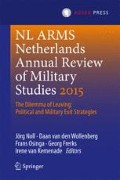Abstract
The moral dimension of exit is closely related to the moral dimension of entry. Notably, when the entry is highly questioned from a moral perspective, by many different actors, there are bound to be moral problems with regard to exit as well. This point will be illustrated by a discussion of the situation in Iraq from the contested entry in 2003 until the present. A firm basis in Just War principles, with a special focus on ‘right intent’ will prove helpful with regard to both entry and exit strategies and with regard to the present-day pendant of Just War, ‘The responsibility to protect’. ‘Right intent’ is seen in the classical Just War tradition as the appropriate inward disposition. It implies no separation in ‘ad bellum’, ‘in bello’ and ‘post bellum’ and is in all these phases aimed at the realisation of ‘peace as the tranquillity of an order ruled by the doing of justice’. This ‘appropriate inward disposition’ seems indispensable in the present-day discussions on entry and exit strategies. In similar ways as the ius ad bellum, in bello and post bellum aspects need to be viewed from the perspective of ‘right intent’, the entry and exit aspects of an intervention need the same ‘appropriate inward disposition’ perspective, which implies acknowledging the responsibilities and obligations and thus the moral dimension that connects entry and exit. In that sense the envisaged exit might lead to a different entry and as such breaks open an opposition that proves hard to maintain from a moral perspective.
Access this chapter
Tax calculation will be finalised at checkout
Purchases are for personal use only
Preview
Unable to display preview. Download preview PDF.
References
AIV (2010) ‘Nederland en de ‘Responsibility to Protect’. De verantwoordelijkheid om mensen te beschermen tegen massale wreedheden’, rapport van de AIV (Adviesraad Internationale Vraagstukken), June 2010
Annan KA (2000) We the Peoples. The Role of the United Nations in the 21st Century. Published by the United Nations Department of Public Information, New York
Burkhardt TA (2013) Reasonable Chance of Success. Analyzing the postwar requirements of jus ad bellum. In Allhoff F (et al) (eds) (2013) Routledge Handbook of Ethics and War, Just War Theory in the Twenty-first Century. Routledge, New York and London, pp 120-132
Bush (2002) The National Security Strategy of the United States of America, September 2002
Croonenberg E (2003) Te beschaafd voor oorlog, HP/de Tijd, 4 April 2003, p 26
Edelstein DM (2009), Exit Lessons. The Wilson Quarterly, Autumn 2009, 33(4):34-39
Gartner SS and Blanken L (2012) Beyond Victory and Defeat. In: Rottstein H and Arquilla J (eds) Afghan Endgames – Strategy and Policy Choices for American’s Longest War. Georgetown University Press, Washington D.C., pp 127-149
ICISS (2001) The Responsibility to Protect Report. Report of the International Commission on Intervention and State Sovereignty. Published by the International Development Research Centre, Ottawa, Canada
Johnson JT (2013) Contemporary Just War Thinking: Which is Worse, to Have Friends, or Critics? Ethics and International Affairs, Spring 2013, 27(1):25-46
May L (2012) After War Ends: A Philosophical Perspective. Cambridge University Press Cambridge
Neurink J (2015) De Oorlog van ISIS. Conserve, Schoorl
Mearsheimer JJ (2005) Hans Morgenthau and the Iraq War: Realism versus Neo-Conservatism. Published on Open Democracy News Analysis (http://www.opendemocracy.net)
O’Leary B (2009), Departing responsibly. In: Welzer M and Mills N (eds) (2009) Getting out. Historical Perspectives on Leaving Iraq. University of Philadelphia Press, Philadelphia, pp 121-135
O’Meara RM (2013) Jus Post Bellum. War closure in the 21st century. In: Allhoff F (et al.) (eds) Routledge Handbook of Ethics and War, Just War Theory in the Twenty-first Century, Routledge, New York and London, pp 105-120
Orme JD (2004) The Paradox of Peace-Leaders, Decisions, and Confl ict Resolution. Palgrave MacMillan, New York,
Packer G (2009) It isn’t over. In: Welzer M and Mills N (eds) Getting out. Historical Perspectives on Leaving Iraq. University of Philadelphia Press, pp 136-145
Paris R and Sisk T (2009) (eds.) The Dilemmas of State Building. Routledge, London and New York
Pollard E (2013), The Place of Just Post Bellum in Just War Considerations. In: Allhoff F (et al) (eds) Routledge Handbook of Ethics and War, Just War Theory in the Twenty-first Century. Routledge, New York and London, pp 93-105
Porter G (2005) The third option in Iraq: a responsible exit strategy, Middle East Policy, vol. XII, no. 3, Fall 2005
Rapport Commissie van Onderzoek Besluitvorming Irak (2010). Boom, Amsterdam
Rose G (1998) The exit strategy delusion, Foreign Affairs 77(1): 56-67
Sharma SK (2008), Reconsidering the ius ad bellum/ius in bello distinction. In: Stahn C and Kleffner JK (eds) Jus Post Bellum. Towards a Law of Transition from Conflict to Peace. TMC Asser Press, The Hague, pp 9-30
United Nations General Assembly (2005) Sixtieth Session, 2005 World Summit Outcome
Verweij D (2014) Hoe juist is de ‘juiste intentie’? De mogelijkheden en onmogelijkheden van de ‘traditie van de rechtvaardige oorlog’. Filosofie & Praktijk 35(1):49-60
Walzer M (2004) Arguing about War. Yale University Press, New Haven/London
Woodward B (2002) Bush at War. Simon & Schuster, New York
Author information
Authors and Affiliations
Corresponding author
Editor information
Editors and Affiliations
Rights and permissions
Copyright information
© 2016 T.M.C. Asser Press and the authors
About this chapter
Cite this chapter
Verweij, D. (2016). ‘Right Intent’: The Moral Dimension of Exit. In: Noll, J., Wollenberg, D., Osinga, F., Frerks, G., Kemenade, I. (eds) Netherlands Annual Review of Military Studies 2015. NL ARMS. T.M.C. Asser Press, The Hague. https://doi.org/10.1007/978-94-6265-078-7_4
Download citation
DOI: https://doi.org/10.1007/978-94-6265-078-7_4
Published:
Publisher Name: T.M.C. Asser Press, The Hague
Print ISBN: 978-94-6265-077-0
Online ISBN: 978-94-6265-078-7
eBook Packages: Law and CriminologyLaw and Criminology (R0)


